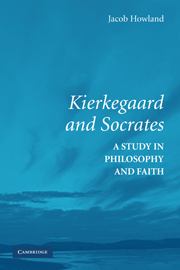Book contents
- Frontmatter
- Contents
- Note on Texts and Translations
- Acknowledgments
- Kierkegaard and Socrates
- Introduction
- 1 Johannes Climacus, Socratic Philosopher
- 2 Climacus's Thought-Project
- 3 Platonic Interlude: Eros and the God
- 4 Climacus's Poetical Venture
- 5 The Paradox and the Passion of Thought
- 6 Self-Love and Offense
- 7 Faith and the Contemporary Follower
- 8 Climacan Interlude: On Historical Necessity
- 9 The Follower at Second Hand and The Moral
- 10 Socrates in Postscript
- Epilogue: Kierkegaard on Christ and Socrates
- Works Cited
- Index
3 - Platonic Interlude: Eros and the God
Published online by Cambridge University Press: 01 December 2009
- Frontmatter
- Contents
- Note on Texts and Translations
- Acknowledgments
- Kierkegaard and Socrates
- Introduction
- 1 Johannes Climacus, Socratic Philosopher
- 2 Climacus's Thought-Project
- 3 Platonic Interlude: Eros and the God
- 4 Climacus's Poetical Venture
- 5 The Paradox and the Passion of Thought
- 6 Self-Love and Offense
- 7 Faith and the Contemporary Follower
- 8 Climacan Interlude: On Historical Necessity
- 9 The Follower at Second Hand and The Moral
- 10 Socrates in Postscript
- Epilogue: Kierkegaard on Christ and Socrates
- Works Cited
- Index
Summary
Johannes Climacus tells the story of a young man who is ardently in love with thinking. For Climacus, philosophy begins with passion. Passion gives birth to his attempt to philosophize, and it has the power to confer authority upon philosophical claims. Climacus recognizes that the essential truth of certain sorts of claims cannot be independently assessed, but depends instead on what one might call the existential commitment of the philosopher. The authority of a religious or ethical thesis derives not simply from the intellectual talent of the one who enunciates it, but also from his willingness to believe and to do what he says. Johannes Climacus thus suggests that the truth of a philosophy as a representation of reality is less important than the truth of a philosopher, or the fidelity with which he lives up to his understanding of things.
As we have seen, Fragments echoes these notions of truth and authority. In his Preface, Climacus associates himself with Socrates, who (he suggests) was able to hold philosophizing together with existing in a way that eluded both Archimedes and Diogenes, and that continues to elude the speculative philosophers. Yet Climacus also leads us to ask whether authority – philosophical talent wedded to existential commitment – is all that one needs in order to attain the truth. This question comes up especially in connection with the god who examines Socrates and orders him to philosophize as a “divine commission” (10).
- Type
- Chapter
- Information
- Kierkegaard and SocratesA Study in Philosophy and Faith, pp. 57 - 78Publisher: Cambridge University PressPrint publication year: 2006

